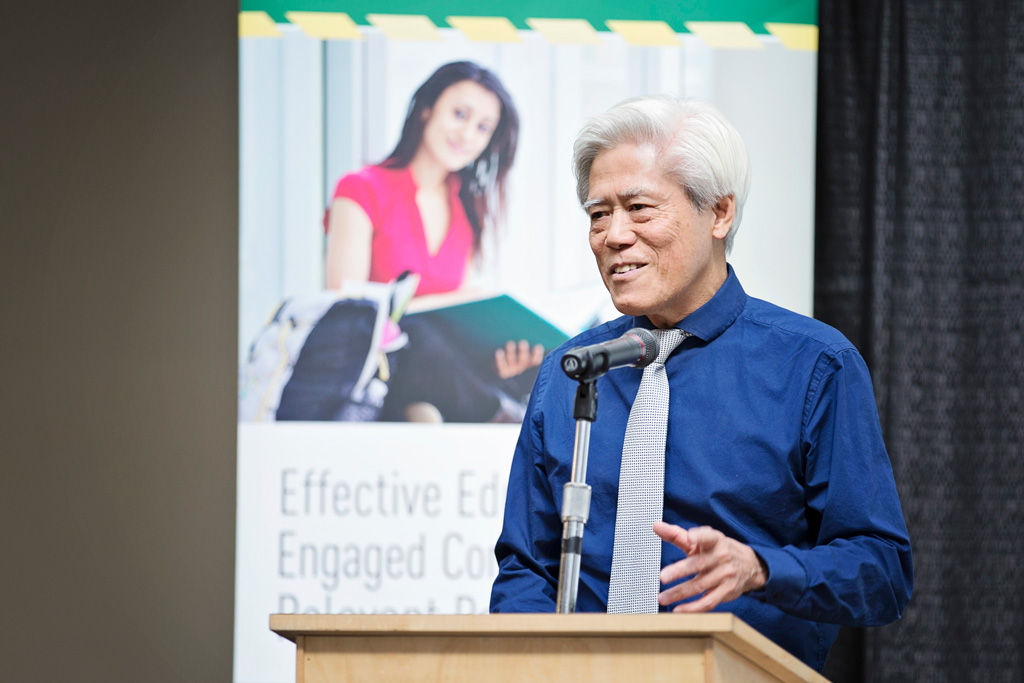
When Kue Young first started as dean of the University of Alberta's School of Public Health in 2013, he said he saw the role as "an opportunity to serve public health in Canada."
Now, as he completes his five-year term as dean, observers reflect on his solid academic leadership, his passion for developing promising new leaders in public health, and his concern for reducing the health inequities of northern and Indigenous communities.
Academic leadership
"Dean Young has made significant impacts in the School, the University and surrounding communities," said David Turpin, president of the University of Alberta.
Young is acknowledged for his strong leadership in guiding the School through two concurrent independent quality reviews.
The President's Visiting Committee reported that the School is highly productive. "The School is well-positioned to contribute positively to the University's strategic plan-For the Public Good-with its clear focus on recruiting and education outstanding students with innovative learning approaches, conducting high quality relevant research and engaging communities."
Similarly, the Graduate Programs Review Committee reported the School is "providing a very strong leadership role and making an important contribution to the advancement of public health."
At a reception held in Young's honour, Steven Dew, provost and vice-president (academic), said, "Dean Young has created a strong and stable foundation for the School. We are grateful for the work he's done in the School and the University, and the leadership he's shown with our northern initiatives."
Faith Davis, former vice-dean in the School, worked closely with Young and saw his academic leadership first hand. "He has raised the profile and supported the growth of the School by hosting international conferences, announcing new centres and supporting curriculum changes," she said.
She also noted his efforts to recruit several strong, talented faculty and administrative staff. "He has worked tirelessly to make sure that each one of us had an opportunity to grow and develop as an educator, researcher and leader."
"I feel strongly positive about the new hires," said Young. "I think we'll look back and see this as a major advance for the School."
New leaders-new student awards
Young's passion for developing promising new leaders in public health was seen, in part, by the way he interacted with students in the School. His open door policy, participation in student initiatives and open-to-everyone Faculty Council meetings enhanced the student experience.
"Dean Young always made every student feel like an important part of the School and like our voices were always heard," recalled student Colin Reynolds. "It made a difference to my student experience."
Although completing his term as dean, Young's commitment to developing new leaders will be enduring. He has established two endowed student awards in honour of his sisters, Kitty Huang and Nancy Suen.
The Kitty Huang Memorial Award in Public Health will be for students from any Canadian northern territory, thereby creating direct pathways for northern residents to pursue excellence in the field of public health. The second award-named the Nancy Suen Memorial Award in Public Health-will support international students from low- and middle-income countries to come to the University of Alberta to study public health.
"Both of these awards embody Kue's generosity and life's work to help reduce health inequities in Canada and abroad, and to educate the next generation of public health leaders from across the globe," said Kim Raine, associate dean (research).
A third new award has been endowed by Doug and Jane Wilson to honour Young and recognize his contributions as dean. The Kue Young Leadership Award in Northern Health is for Indigenous students from the northern territories who have demonstrated leadership and community involvement in the field of public health in the northern territories of Canada.
Northern and Indigenous initiatives
By all standards, Young's greatest contribution-and certainly his legacy-to the University of Alberta has been to position the School to strengthen its contributions to northern and Indigenous health.
In the past two years, Young recruited faculty members whose work focuses on northern and Indigenous health. In addition, the School is developing a strategy to answer the Calls to Action put forth by the Truth and Reconciliation Commission (TRC) in 2015. [See School's Indigenous strategy a step towards reconciliation.]
And Young's recent appointment of five Indigenous adjunct professors (non-faculty instructors) and the creation of an Elders-in-Residence program aims to ensure programs and planning incorporate traditional knowledge and values, and to provide resources and learning opportunities for students, faculty and staff.
"I think it is critical that we recognize these individuals," said Young. "They have a lot of knowledge and experience, and our students should be exposed to people like this."
According to Roger Epp, director of UAlberta North, "Kue has been a quiet, skillful revolutionary in nudging the university to reclaim a "north-facing" identity for the next generation."
Epp thinks Young knows this identity must be earned through respectful partnership with northerners. "His commitment to a meaningful presence in Yellowknife is pivotal in this respect. Much good will come of it."
Journey's end
Reflecting on his time with the School, Young said, "This has been the crowning achievement-to be dean of the School. I will look back and say, 'I was glad to be a part of it.'"